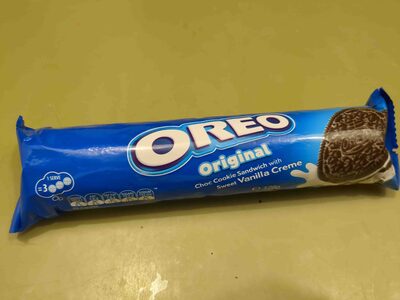
Barcode: 9300650452701
Oreo Original
HALAL
📝 Reason: While most ingredients in Oreo Original are plant-derived and use Halal ECodes (E500, E503, E319), the term ‘flavor’ is ambiguous and can involve alcohol or animal sources, making its status Doubtful (i.e., questionable/unconfirmed Halal). Since a Doubtful ingredient exists, per Islamic guidelines (Quran 5:3, www.ifanca.org) and the provided strict rules, the entire product is classified as Doubtful (2) until proper Halal certification is provided.
🏷️ Category: Snacks, Sweet Snacks, Biscuits And Cakes, Biscuits And Crackers, Biscuits, Biscuit Cookie Snack W Chocolate Filling
📄 Certificates: Vegetarisch
Ingredients:
Details
Exploring the Halal Status of Oreo Original
When it comes to snacks, Oreo Original has captured the hearts of many worldwide. However, for those observing Halal dietary laws, a common question arises: Is Oreo Original Halal? In this post, we will dive deep into the ingredients, E-numbers, and overall Halal status of Oreo Original to provide clarity.
Understanding Halal Certification
Halal certification is essential for many consumers who adhere to Islamic dietary laws. These guidelines dictate what is permissible to consume, meaning that even a single questionable ingredient can categorize a product as doubtful.
The Ingredients of Oreo Original
The ingredients in Oreo Original include:
- Wheat flour
- Sugar
- Vegetable oil
- Cocoa powder
- Fructose syrup
- Cornstarch
- Salt
- Raising agent (E500)
- Raising agent (E503)
- Emulsifier (soy lecithin)
- Flavor
- Antioxidant (E319)
- Minerals (iron, zinc)
- Vitamins (riboflavin, thiamin, folate)
Breaking Down the E-numbers and Ingredients
Let’s examine the Halal status of each ingredient to clarify Oreo Original’s overall position:
- Wheat flour – Halal. This is a common cereal grain that contains no animal or haram derivatives.
- Sugar – Halal. Typically, sugar is acceptable unless processed with bone char, which is rare.
- Vegetable oil – Halal. Usually derived from plants, vegetable oil is Halal unless it becomes contaminated.
- Cocoa powder – Halal. Plant-based and free of animal derivatives, cocoa powder is safe for consumption.
- Fructose syrup – Halal. Derived from fruit or corn, making it acceptable.
- Cornstarch – Halal. A plant-based ingredient that is derived from corn.
- Salt – Halal. Naturally mineral-based, salt is inherently Halal.
- Raising agent (E500) – Halal. Sodium carbonate/bicarbonate is considered Halal.
- Raising agent (E503) – Halal. Ammonium carbonate/bicarbonate is also Halal according to Halal standards.
- Emulsifier (soy lecithin) – Halal. Soy lecithin is plant-derived, making it acceptable.
- Flavor – Doubtful. This term can refer to ambiguous sources, including alcohol or animal-based ingredients. Without clear Halal certification, this ingredient raises concerns.
- Antioxidant (E319) – Halal unless specified otherwise. E319 (TBHQ) should not be dissolved in alcohol, which is not indicated for this product.
- Minerals (iron, zinc) – Halal. These elemental minerals do not pose any issues.
- Vitamins (riboflavin, thiamin, folate) – Halal. Generally synthesized or plant-based unless derived from animals, which is uncommon.
Final Thoughts on Oreo Original’s Halal Status
While most ingredients are plant-derived and carry Halal E-codes, the generic term ‘flavor’ is potentially problematic due to its ambiguous nature. According to Islamic dietary guidelines referenced in the Quran 5:3, any ingredient that cannot be definitively categorized as Halal can render the whole product ‘Doubtful’ until a proper certification is provided. Thus, for those strictly adhering to Halal consumption, it may be advisable to exercise caution when consuming Oreo Original.
Where to Find Reliable Halal Products
Make sure to always check for proper Halal certification on products to ensure they meet your dietary requirements. Your health and adherence to faith should come first, and knowing what you’re consuming is crucial for maintaining that balance.
